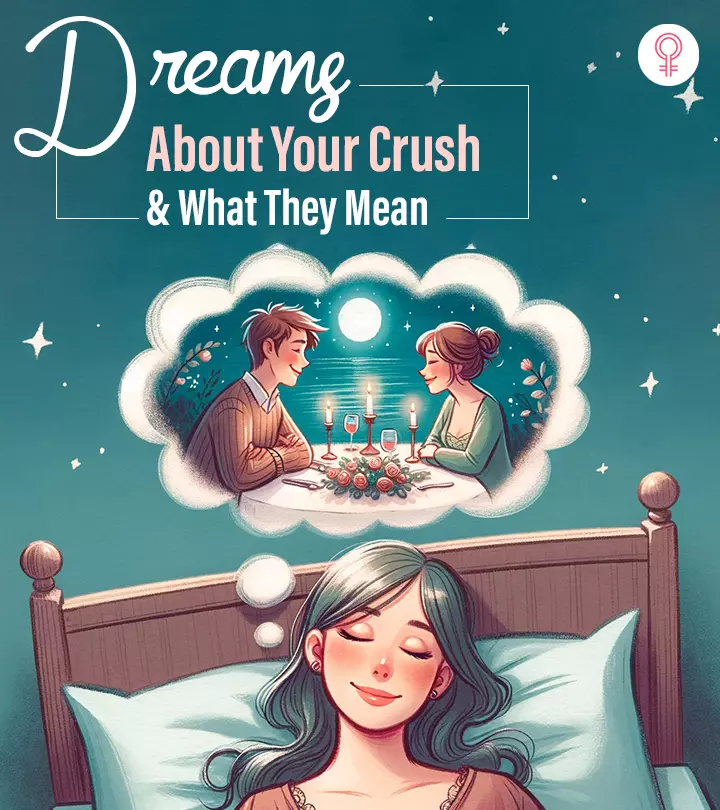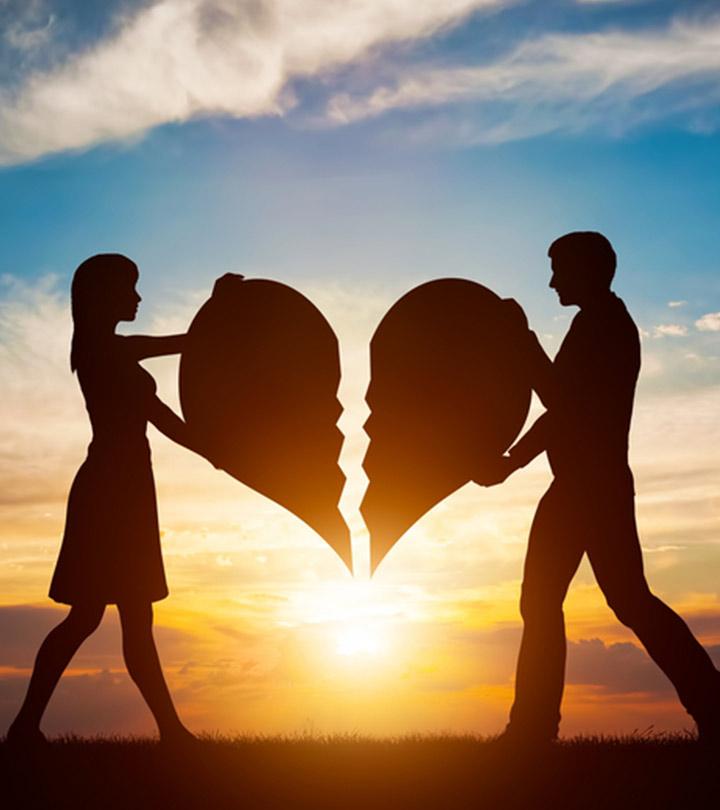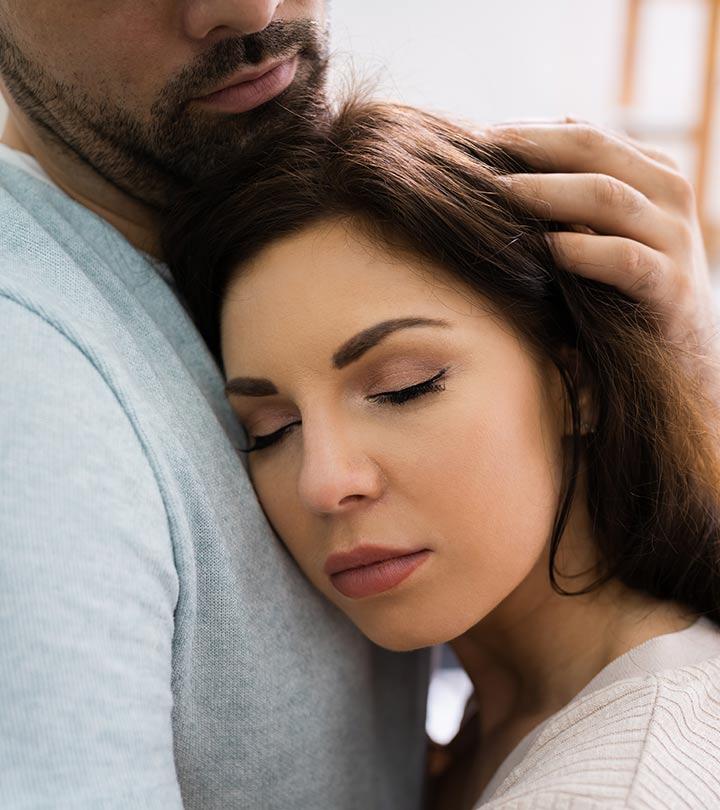Why Do We Fall In Love With Someone? What Happens To Our Brain?
Unravel the mystery behind the overwhelming emotions of love, one fact at a time.

Image: Shutterstock
Why do we fall in love? Some people fall in love because they feel a connection or some form of attraction, while others may remark they feel at ease with a certain individual.
Love is a wonderful thing that has the ability to alter the direction of your life. It is the only sensation in the world that can make you fall so hard for someone that you’re willing to make a fool of yourself for them! But if you have ever been in (or out) of love, you must have stopped to wonder why we fall in love in the first place. Today, we are going to answer this question for you! We will go through all the reasons that people fall in love with each other, as well as how it impacts our brains. Keep reading to find out more!
In This Article
What Is Love?
Love is defined as an intense feeling of deep affection. Ancient Greek philosophy describes eight different types of love.
- Philia: Platonic love between friends and family
- Pragma: Long-lasting or persistent love
- Storge: Familiar love
- Eros: Romantic love
- Mania: Obsessive love
- Agape: Selfless love
- Ludus: Playful love
- Philautia: Self love
Robert Sternberg, an American psychologist, came up with a theory that the three main components of love are intimacy, passion, and commitment (1). He called it the Triangular Model of Love. These three components in different combinations give rise to the eight different types of love. Romantic love occurs when intimacy and passion are at high levels with a moderate commitment level.
Let’s focus on romantic love. Romantic love certainly does not feel as simple as an intense feeling. After all, wars have been waged in the name of love. The most famous fictional couples of all time, Romeo and Juliet, die for love. We have also heard many a song dedicated to love, read a plethora of love stories, and seen a million movies where love always wins.
Someone once said, “Humans are creatures simply looking for love. That is their purpose. Until they find it, they roam without knowing the meaning of their existence. Once they find love, their life begins.”
 Did You Know?
Did You Know?So, what is it exactly that makes us fall for someone so hard that we would be willing to give up our lives for them? Find out in the next section!
Why We Fall In Love – Contributing Factors
- Companionship
People don’t want to be alone. From a young age, we learn to be dependent on other people, like our parents. Once we start going to school, we are encouraged to make friends. We feel the need for companionship from a very young age. Sometimes, when we find the perfect companion to match us, and it turns into love. This is why some of the most common love stories we hear follow the best friends-turned-lovers trajectory. You both know each other very well, including all the good, bad, and ugly that comes with being with them. It makes being together easy.
- Compatibility
Many people have a checklist of things they want in their ideal partner. Once they find all, or most, of their ideal points met in a person, they see them as a match. Either they immediately like the person, or they learn more about them and build their love. Remember, we may feel attracted to a potential partner, but we also need to attract them to us, showing our strength of character, confidence, our caring, loving nature for a mutual attraction to grow.
- Common Interests
Finding someone with similar interests as yours is a big contributing factor to falling in love with that person. You spend more time with each other because you have common hobbies and interests.
- Attraction
Let’s be honest – love, at first sight, is basically just attraction and often a fairytale experience. Either you are attracted to their appearance or their personality. Once there is an attraction between two people, spending time with each other only builds love and connection, particularly when you share similar values e.g. trust, honest, or you are both wanting to have a family.
- Intimacy
When two people become physically intimate with each other, it can strengthen their bond and increase the love they have for each other. Intimacy is not only physical. Once you start sharing experiences and intimate details of your life and become vulnerable with them, you may start feeling a new, deeper kind of love toward them with the right partner.
- Attachment
We tend to build attachments with people. These attachments make us grow closer together, strengthening our love for each other. Once you build an attachment, it is easy to fall in love. Attachment also makes you depend on your partner for either emotional support, general love, and appreciation, or physical intimacy.
- Desirable Traits
If a person showcases traits you find attractive, you will be attracted to them. If you are someone who reads a lot, you will like people who are well-read. If you are focused on fitness, you will like people who take their health seriously. If you like blue eyes, you may be more attracted to someone with blue eyes. Any traits you find desirable can increase the love you have for a person. However, love doesn’t arrive pre-packaged. Be open to a potential partner. Accept them unconditionally. If you have identified what is most important to you about the relationship and they share your deep seated values, this is the basis of building a stronger relationship foundation together.
- Reciprocation
If you like a person and they like you back, it automatically increases your feelings for them. When a person tells you that they like you back, you feel safer being vulnerable with them for healthy communication to develop and grow stronger.
- Needs
We all have certain needs. Those needs can be emotional, physical, or even just general needs like the want to get married, have children, find a partner who loves to travel, or someone you would love to share your life and future with. When you learn to better understand your needs, it is so much easier to better understand your partner’s.
- Social Status
For some people, social status is very important. This is especially true for arranged marriages. Having a good or decent social status increases the desire to know the other person and your attraction toward them. However, it is equally important that the qualities of the person you want to share your life with match yours. If you measure social status on external factors alone, the relationship will often be lonely or lack the deeper connection you want.
- Sparks
Sometimes, you may know a person for a long time and not feel anything for them until you are placed in a situation that makes sparks fly between you two. You find yourself and another person in an unusual situation (maybe stranded in the middle of nowhere because your car broke down?), and you see qualities in that person that ignites your attraction to discover feelings you never knew you had.
- Togetherness
Spending time with a person can increase your feelings for each other and transform into love if you share a mixture of ingredients for love to grow. The more time you spend together, the more you get to know each other, and recognize you share important values, qualities, hobbies, and interests. You encourage each other to follow your dreams as well as spend time separately. Sharing quality time together allows room for a relationship to develop and love to grow stronger for each other.
- Passion
Passion is important for a relationship to thrive. It is important to make an effort to keep the spark alive, to have fun, and share new experiences together to feel more emotionally connected. Passion is more heightened in the first few years together, known as the honey moon period, but gradually over time, love grows into a much deeper connection and understanding of each other. Keeping the passion alive and making time for intimacy takes two people to communicate their needs, allowing also for flexibility if one partner has a more tiring schedule. Intimacy and passion might be the top of your list in a relationship, but the relationship may lack the emotional deeper connection or empathy. Passion alone doesn’t keep a relationship alive, so consider what is important to you.
- Loneliness
Loneliness is a major contributing factor that can drive people to seek connections and love. Feeling lonely can create a desperate desire for companionship, making individuals more eager to form emotional bonds. The yearning for understanding and shared experiences can prompt the search for a romantic partner, where love becomes the source of comfort that can possibly alleviate the isolation that loneliness brings. Hence, having someone address this feeling can lead to meaningful connections and falling in love with someone who fills your emotional void. So, if you often find yourself gripped by loneliness, then allowing someone to enter your life and forming a deep connection with them can help in combating this common problem.
We know that once we fall in love, we’re on a high. Being in love also affects your body and brain. Here’s how!
What Happens To Your Brain And Body When You Fall in Love
The Brain
In neuroscience, love is said to be a very strong emotion that is greater than other emotions. When you are in love, your anxiety and fear reduce while euphoric happiness increases. In a study conducted in Turkey, 18 people who were deeply in love had their brain activity monitored when shown a picture of the person they loved (2). This triggered a lot of activity in some areas of their brains.
The most significant activity came from the ventral tegmental area, known to produce 90% of the dopamine in the brain. Dopamine creates the feeling of unity with the person you love. When you love someone, your brain releases dopamine which increases your bond with the other person. It also increases your libido and need to procreate if having children is part of your life plan.
Also, remember the saying “love is blind?” What it basically means is that when people fall in love, they can’t think straight or notice anything wrong. According to research, this may actually be true. When you are in love, you are on a dopamine high that makes you feel happy. But, this hinders activity in the prefrontal region of your brain. This region is responsible for visualization, decision making, and logical deduction. It is the main source of logic, morality, and respect. So, yes, love does make you do stupid things! So, consider what is important to you before dating someone, when you are level headed, logical, and more discerning and not on a dopamine high.
 Trivia
TriviaThe Body
Love has intense physiological effects on the body, as well. When you love another person, your body tends to react in significant ways. Apart from the general reaction of arousal, there are a few other common signs. People feel butterflies in their stomach, and they tend to eat less. When they see the person they love, they become sweaty, and their heart rate increases. So, it looks like all the things they show in rom-coms are true!
Research shows that there can be a decrease in appetite and a loss of interest in food and drink (2). There is also a decrease in pain sensitivity. There is an increase in pulse rate, heart palpitations, sweating, trembling, and intestinal activity. There is also an increase in the rate of swallowing and an increase in stomach acidity. Another reaction of the body is to release pheromones to attract people of the opposite gender (1).
Key Takeaways
- Love is a strong affection for another person arising from kinship or sexual desire. The intense feeling can be based on admiration, benevolence, and common interests.
- The need for companionship to share life together is one of the top reasons for falling in love.
- If two people share many common interests and strong values, there is a high chance of falling in love.
- Attraction, having fun, and spending quality time with each other are major reasons to fall in love.
- Get clear about what is important to you, discern the top qualities and values you consider important, recognize a partner’s communication style to make a better informed choice.
What is life without love, after all? If you fall in love, do not let your feelings fade away with time. Instead, embrace them as they are truly precious. Sharing an intense connection with somebody brings a feeling of belongingness and intimacy. And when you share common interests with them, you may gradually fall in love with that person. How wonderful would it be to be with someone whose likes and dislikes are similar to yours!
Never take love for granted. It is a gift you should treasure. Learn the communication skills you need to know to recognize the right partner for you beyond looks and attraction. This article has tried to cover everything to answer your question: ’Why do we fall in love?’ Now, it is your turn to identify your feelings, acknowledge them and nourish them. Love is all we need to make the world a better place.
Frequently Asked Questions
Do we choose who we fall in love with?
Some people fall in love with someone they never thought of or expected. While others, as seen in most arranged marriages, learn to grow on their partners. Love can happen both ways! You have to decide if you want to act on it or let it pass.
How many times do we fall in love?
Most people believe humans fall in love thrice at different stages in their lifetime. The first, when they are young, it is called puppy love. Their next love teaches them to grow and become mature. The last is said to be their true love.
Which love is true- first or second?
The first time you fall in love, the high is nothing like you’ve ever felt, and you may think this is it. But, that first love teaches you to navigate relationships better. While everyone always remembers their first love, you are more mature the second time you fall in love. You love at a deeper level and understand things better.
Why do we fall in love with someone we can’t have?
Most people are attracted to qualities that they don’t have but want. When you meet someone with those qualities, you get attracted to them, only to realize that you can’t have them. Another reason could be the idea of it being a “forbidden love,” someone you can’t have but desperately want. While you may feel excited, the thrill of forbidden love usually dies out. The last theory on why this happens is intimacy issues. You might love someone you can’t have because you have intimacy issues, leading to self-sabotage.
Can you ever stop loving someone?
Yes, you can, but it will take effort. You have to work hard at forgetting and not thinking about them. No matter how much you want to reach out to them for closure or any other reason, you shouldn’t. Instead, focus on yourself, your goals, and your career.
What makes a man fall deeply in love with a woman?
According to psychologist Robert Sternberg, intimacy, passion, and commitment make a man feel strongly attached to a woman.
Explore the fascinating journey of how the brain falls in love from the video below. From chemical reactions to emotional triggers, get insights about the intricate process of falling head over heels, that has less to do with the heart.
References
Articles on StyleCraze are backed by verified information from peer-reviewed and academic research papers, reputed organizations, research institutions, and medical associations to ensure accuracy and relevance. Read our editorial policy to learn more.
- General Theories of Love
https://www.sagepub.com/sites/default/files/upm-binaries/3222_ReganChapter1_Final.pdf - The Brain in Love: Has Neuroscience Stolen the Secret of Love?
https://www.researchgate.net/publication/275606713_The_Brain_in_Love_Has_Neuroscience_Stolen_the_Secret_of_Love
- General Theories of Love
Articles on StyleCraze are backed by verified information from peer-reviewed and academic research papers, reputed organizations, research institutions, and medical associations to ensure accuracy and relevance. Read our editorial policy to learn more.
Read full bio of Karen Marshall
Read full bio of Asmita De
Read full bio of Gracia Odile

























